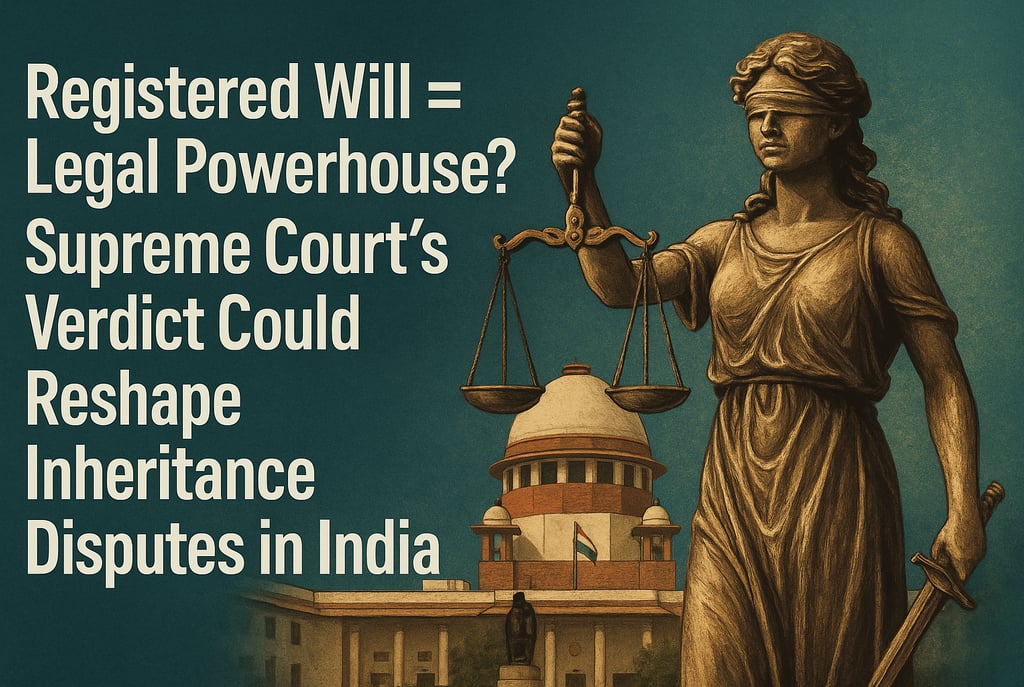Registered Wills Carry Legal Weight: Why the Supreme Court’s Latest Ruling Could Change Property Disputes Forever
The Supreme Court’s 2025 ruling reinforces the legal presumption attached to registered Wills in India, shifting the burden of proof to those who challenge them. A turning point for inheritance and succession battles.
Adv Nadeem Saifi | Partner | Altius Astra Attorney
7/22/20253 min read
Registered Will = Legal Powerhouse? Supreme Court’s Verdict Could Reshape Inheritance Disputes in India.
Can a single signature change the course of a property battle? In a recent landmark judgment, the Supreme Court of India emphatically ruled that a registered Will enjoys a strong presumption of genuineness, placing the burden of proof on the challenger to disprove its legitimacy. This decision could have seismic implications for inheritance litigation across the country.
Let’s break down what this means—and why it matters so much.
The Dispute: When Property Turns Into a Battlefield
Property disputes in India often become long-drawn emotional sagas, especially when step-relations and second marriages come into play. In the case at hand, the conflict was rooted in a 4-acre 16-gunta agricultural property in Andhra Pradesh, originally owned by a patriarch who passed away before 1949.
His son, Rajanna, executed a registered Will in 1974, dividing the property among his second wife Lasum Bai (Appellant) and children from his first marriage. After his death in 1983, the expected happened, his son Muthaiah (Respondent) challenged the Will, claiming the property as ancestral and demanding full ownership under Hindu Succession law.
But here's where the plot thickens.
The Supreme Court’s Game-Changing Rationale
In a crisp but decisive opinion, the bench comprising Justice Vikram Nath and Justice Sandeep Mehta overturned the Andhra Pradesh High Court’s decision, restoring the Trial Court’s original decree that declared Lasum Bai the absolute owner of the property.
The Key Takeaways:
Registered Wills Carry Presumption of Genuineness:
A registered Will isn’t just another document. As per Indian Evidence Law and judicial precedent, it raises a legal presumption of due execution and authenticity, unless proven otherwise.
Burden of Proof Lies on the Challenger:
The Court observed that since Muthaiah admitted his father’s signature on the Will, and did not raise any serious objections when the Will also benefitted himself and his sister, the burden of discrediting the Will was not discharged.
Oral Family Arrangement Backed by Possession:
The oral settlement which divided the land between Lasum Bai and Muthaiah was supported by possession records. Lasum Bai cultivated the northern portion, Muthaiah the southern. The Court saw this real-life conduct as solid proof of the arrangement.
No Suspicious Circumstances Established:
Crucially, the Court noted that there were no suspicious circumstances surrounding the execution of the Will. It wasn’t sudden, secretive, or clearly one-sided. In fact, it harmonized with the oral division of land.
Why This Judgment Matters: Beyond the Case
This isn’t just a win for Lasum Bai. It’s a powerful precedent that could have ripple effects in similar cases involving:
Step-relationships and second marriages, where Wills often favor one side.
Oral family settlements, which are difficult to prove unless accompanied by possession or conduct.
Registered Wills, where the assumption of validity now has the Supreme Court’s fresh stamp of approval.
Legal Insight: What This Means for Future Litigants
For lawyers, clients, and estate planners, here’s the takeaway:
Don’t underestimate the power of registration. A Will registered under the Indian Registration Act, even without witnesses deposing in court, still carries significant evidentiary value.
Admissions in cross-examination are game-changers. If a party acknowledges the signature or benefits from the Will, their later denial often lacks credibility.
Combine oral settlements with actual possession. If you're relying on an informal family division, document the possession pattern or land use clearly.
A Hypothetical: What If the Will Was Unregistered?
Let’s play devil’s advocate. Had Rajanna’s Will been unregistered, and had Muthaiah strongly denied its execution, the outcome might’ve been very different. Courts have repeatedly held that unregistered Wills require stricter scrutiny and corroborative testimony, especially when contested.
So, while registration doesn’t automatically prove genuineness, it flips the legal burden, which can be a crucial advantage in bitter inheritance fights.
Final Thoughts: Is the Supreme Court Signaling a Shift?
India is witnessing a rise in inheritance disputes, especially in urban and semi-urban contexts where land value has skyrocketed. In this environment, clarity and enforceability are essential.
By reaffirming the strength of registered Wills—and by aligning documentary intent with practical possession—the Supreme Court might be nudging litigants to rely more on legal formality and written clarity, rather than oral promises and vague recollections.
So, is this the end of speculative property claims based on oral history? Maybe not. But it certainly raises the bar for those who choose to contest a registered testament.
Case Citation:
METPALLI LASUM BAI (SINCE DEAD) AND OTHERS V. METAPALLI MUTHAIAH(D) BY LRS., 2025 LiveLaw (SC) 734


Altius Astra Attorneys
A premier law firm based in Delhi, India, offering legal representation across various practice areas for citizens rights and interests.
© 2025. Altius Astra Attorneys. All rights reserved.
Contact Us
📞 9899290789, 9818786756
📧 contact@altiusastra.com
3C-ED Block, Madhuban Chowk, Pitampura, Delhi-110034
DISCLAIMER
